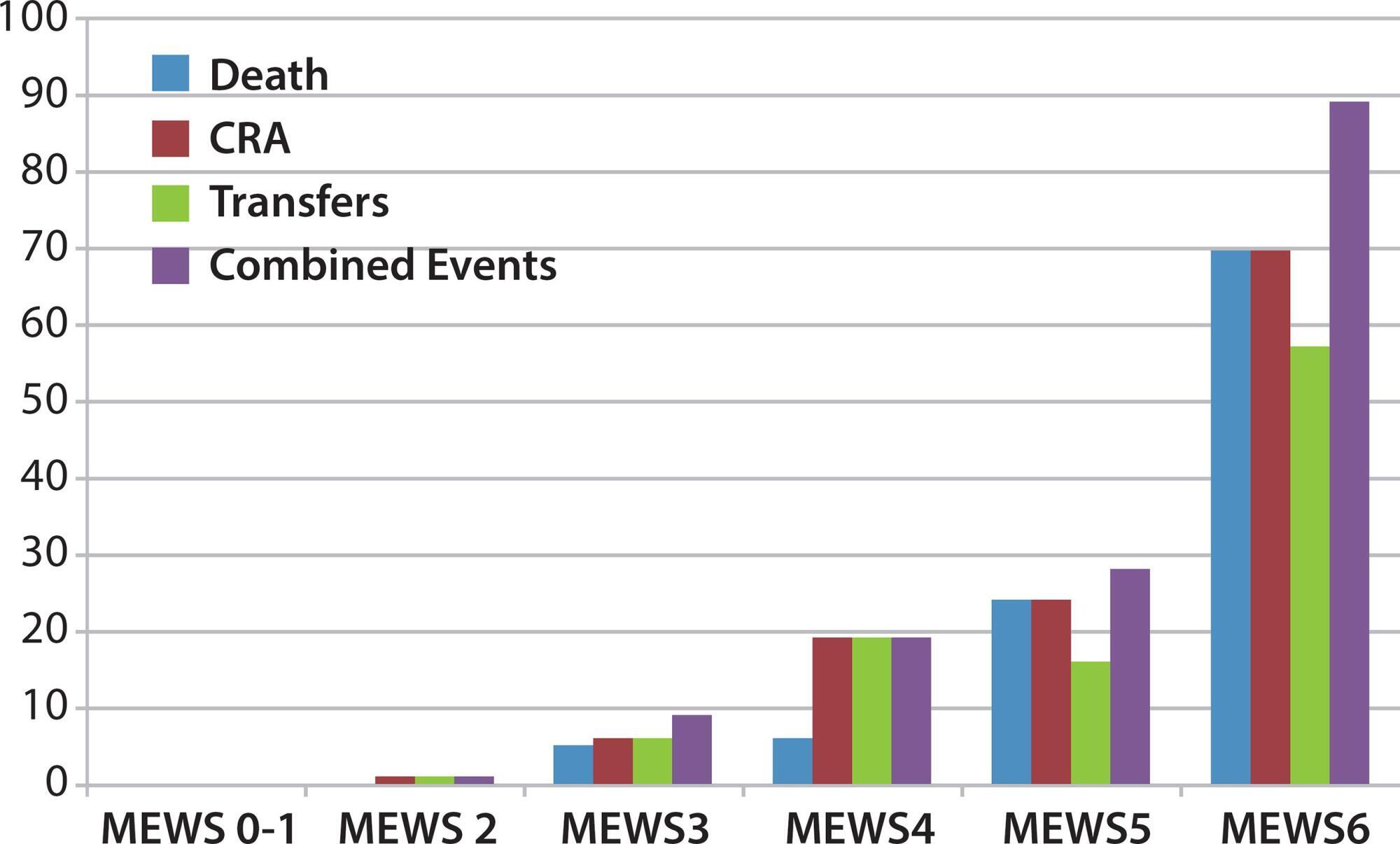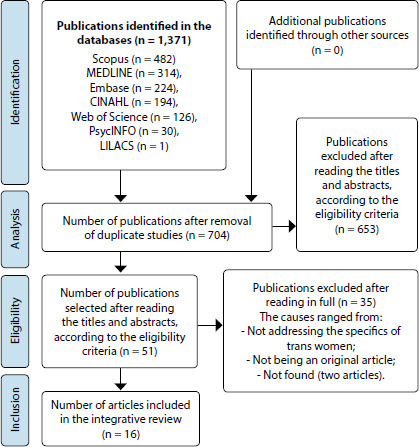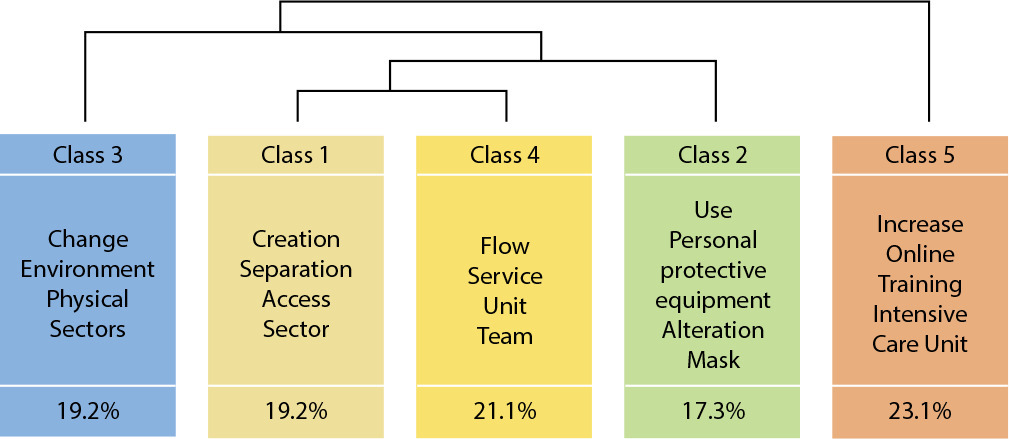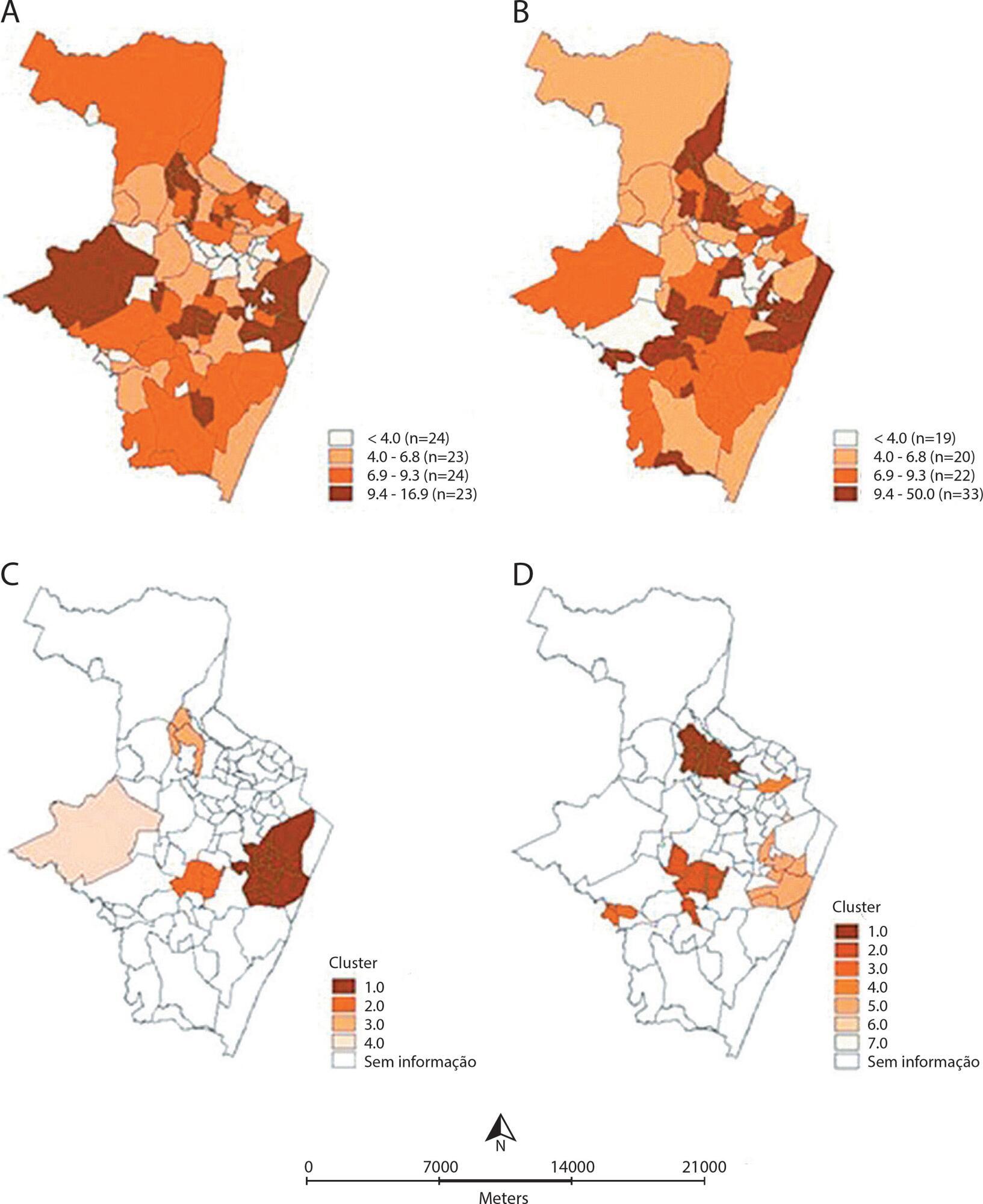-
RESEARCH
Children with neuropsychomotor development delay: music therapy promoting quality of life
Revista Brasileira de Enfermagem. 2015;68(5):797-802
01-01-2015
Abstract
RESEARCHChildren with neuropsychomotor development delay: music therapy promoting quality of life
Revista Brasileira de Enfermagem. 2015;68(5):797-802
01-01-2015DOI 10.1590/0034-7167.2015680505i
Views0See moreABSTRACT
Objective:
to identify the influence of music therapy on the behavior and quality of life of children with neuropsychomotor development delay (NPMDD).
Method:
experimental research, with applications of music therapy (in a group of children) held in the specialized association in Cruz das Almas – Bahia, composed of 17 children with NPMDD aged 5 to 12 years. The behavior of children involving emotional, physical, social and school aspects was observed.
Results:
there was an evolution in all aspects, being this improvement significant to Emotional Capacity and School Capacity domains, showing the beneficial effects of music therapy.
Conclusion:
music therapy becomes a treatment option for children with NPMDD, improving their quality of life.

-
RESEARCH
Spirituality, religion and personal beliefs of adolescents with cancer
Revista Brasileira de Enfermagem. 2015;68(5):791-796
01-01-2015
Abstract
RESEARCHSpirituality, religion and personal beliefs of adolescents with cancer
Revista Brasileira de Enfermagem. 2015;68(5):791-796
01-01-2015DOI 10.1590/0034-7167.2015680504i
Views0See moreABSTRACT
Objective:
to examine adolescents’ perception about spirituality, religion and personal beliefs in their lives due to cancer and a possible strategy for coping with the disease.
Method:
qualitative research, both descriptive and exploratory. The data were collected by means of a personal semi-structured interview, and the categories were analyzed by content analyzes.
Results:
nine adolescents who were undergoing cancer treatment at one of the two institutions located Uberaba, Brazil, participated in the study. Based on the analysis and interpretation of results, it was possible to systematize them according to four categories: spiritual history of the individual; faith and belief; importance of spirituality in their lives, and the community acting as a spiritual supporter. Most adolescents referred to spirituality as being an important tool for dealing with the disease, especially concerning religious rituals and community support.
Conclusion:
spirituality creates hope for adolescents, which helps them to cope with cancer-related diffi culties and contribute to the search for the meaning of life.
-
RESEARCH
Coping strategies of nursing students for dealing with university stress
Revista Brasileira de Enfermagem. 2015;68(5):783-790
01-01-2015
Abstract
RESEARCHCoping strategies of nursing students for dealing with university stress
Revista Brasileira de Enfermagem. 2015;68(5):783-790
01-01-2015DOI 10.1590/0034-7167.2015680503i
Views0See moreABSTRACT
Objective:
to identify the coping strategies used by nursing students in a university in southern Brazil, establishing the relationship between the sociodemographic and academic variables examined.
Method:
an exploratory, descriptive, quantitative study, carried out with 146 nursing students, through application of the Coping Strategies Inventory. For the data analysis, descriptive statistics, analysis of variance and regression analysis were used.
Results:
it was found that the coping strategy most used by nursing students is escape. A connection was also detected between the academic dissatisfaction variable and the use of negative coping strategies.
Conclusion:
it was noted that students satisfi ed with the course used positive coping strategies targeting the problem, whereas dissatisfi ed students used negative strategies focusing on the emotion.

-
RESEARCH
Unemployment and psychological distress in nurses
Revista Brasileira de Enfermagem. 2015;68(5):775-782
01-01-2015
Abstract
RESEARCHUnemployment and psychological distress in nurses
Revista Brasileira de Enfermagem. 2015;68(5):775-782
01-01-2015DOI 10.1590/0034-7167.2015680502i
Views0See moreABSTRACT
Objective:
to assess psychological distress in nurses searching for their first job, especially symptoms of depression, and identify the factors that caused mental suffering, and how these nurses cope with the situation.
Method:
this was a qualitative study carried out with unemployed nurses who had graduated less than two years before the time of the study, and were residents of the town of Assis in the Brazilian state of São Paulo. Data were gathered by means of semi-structured interviews, content analysis, and application of the Beck Depression Inventory psychometric scale.
Results:
of the 14 nurses that participated, three had scores on the psychometric scale indicative of depression. Participants reported psychological distress related to unemployment, poor university education, and surplus labor due to the large number of graduates and lack of jobs, as well as a culture of employment centered on professionals’ social networks. The unemployed nurses did not have effective ways of coping.
Conclusion:
unemployment promoted psychological distress among the new nurses, especially symptoms of depression, without effective means of coping.
-
EDITORIAL
Teste de triagem neonatal: expandir ou não expandir?
Revista Brasileira de Enfermagem. 2015;68(5):771-772
01-01-2015
Abstract
EDITORIALTeste de triagem neonatal: expandir ou não expandir?
Revista Brasileira de Enfermagem. 2015;68(5):771-772
01-01-2015DOI 10.1590/0034-7167.2015680501i
Views0“A principal restrição sobre o que podemos detectar no teste de triagem neonatal está rapidamente se tornando o que escolhemos detectar em vez daquilo que nos é limitado por razão de viabilidade técnica ou custo”().Os avanços tecnológicos estão conferindo ao mundo médico uma oportunidade de aumentar o número de patologias para as quais os recém-nascidos […]See more -
EDITORIAL
Newborn blood spot screening: to expand or not to expand?
Revista Brasileira de Enfermagem. 2015;68(5):771-772
01-01-2015
Abstract
EDITORIALNewborn blood spot screening: to expand or not to expand?
Revista Brasileira de Enfermagem. 2015;68(5):771-772
01-01-2015DOI 10.1590/0034-7167.2015680501i
Views0“The principal constraint on what we can detect in newborn screening is fast becoming what we choose to detect: rather than what is limited for us by technical feasibility or cost”().Technological advances are providing the medical world an opportunity to extend the number of conditions newborn babies are screened for. Tandem mass spectrometry (TMS, also […]See more -
REVIEW
International Classification for Nursing Practice – ICNP®: application to the Brazilian reality
Revista Brasileira de Enfermagem. 2015;68(4):730-731
01-01-2015
Abstract
REVIEWInternational Classification for Nursing Practice – ICNP®: application to the Brazilian reality
Revista Brasileira de Enfermagem. 2015;68(4):730-731
01-01-2015DOI 10.1590/0034-7167.2015680422i
Views0The author and organizer, Telma Ribeiro Garcia, added her theoretical and practical knowledge to those of a dozen other authors for the creation of the book “International Classification for Nursing Practice – ICNP®: application to the Brazilian reality”. She is a retired professor of the Department of Public Health Nursing and Psychiatry at the Federal […]See more -
REFLECTION
Linhas de pesquisa em enfermagem: destaques filosóficos e epistemológicos
Revista Brasileira de Enfermagem. 2015;68(4):723-729
01-01-2015
Abstract
REFLECTIONLinhas de pesquisa em enfermagem: destaques filosóficos e epistemológicos
Revista Brasileira de Enfermagem. 2015;68(4):723-729
01-01-2015DOI 10.1590/0034-7167.2015680421p
Views0See moreRESUMO
Objetivo:
elucidar destaques filosóficos e epistemológicos mediante considerações significativas, essenciais, em favor da causalidade de questões no interesse da Enfermagem.
Método:
abordagem fundamentada nas proposições teóricas de Johannes Hessen, com referência a outros autores expertos no tema.
Resultados:
esclarecimento de aspectos substantivos e implicações adjetivas não só no interesse da investigação, ressaltando os significados essenciais do assunto, condizente com as elaborações de dissertações de mestrado e teses de doutorado de Enfermagem.
Conclusão:
trata-se de uma contribuição valiosa para esclarecer melhor detalhes da construção do conhecimento na temática e problemática do assunto posto em causa, as linhas de pesquisa em enfermagem.

-
ORIGINAL ARTICLE
Evaluation of the performance of the modified early warning score in a Brazilian public hospital
Revista Brasileira de Enfermagem. 2019;72(6):1428-1434
10-21-2019
Abstract
ORIGINAL ARTICLEEvaluation of the performance of the modified early warning score in a Brazilian public hospital
Revista Brasileira de Enfermagem. 2019;72(6):1428-1434
10-21-2019DOI 10.1590/0034-7167-2017-0537
Views0ABSTRACT
Objective:
To evaluate the performance of the modified early warning score (Mews) in a nursing ward for patients in clinical deterioration.
Method:
This is an analytical, quantitative and predictive study. Mews’ parameters (systolic blood pressure, heart rate, respiratory rate, temperature and level of consciousness) were evaluated every six hours. The following events were reported: death, cardiopulmonary arrest and transfer to intensive care. The evaluations were performed in a hospital of reference in the state of São Paulo, Brazil.
Results:
A total of 300 patients were included (57 ± 18 years old, males: 65%). There number of combined events was observed to be greater the higher the score’s value (00%; 00%; 01; 09%; 19%; 28%; 89%, respectively, for Mews 0; 1; 2; 3; 4; 5 and 6; p < 0.0001). Mews ≥ 4 was the most appropriate cut-off point for prediction of these events (sensitivity: 87%, specificity: 85% and accuracy: 0.86).
Conclusion:
Mews properly measured the occurrence of severe events in hospitalized patients of a Brazilian public hospital’s nursing ward. Mews ≥ 4 seems to be the most appropriate cut-off point for prediction of these events.
Keywords:Critical CareEmergency MedicineNursing CareOrgan Dysfunction ScoresRapid Response Teams in HospitalsSee more
-
ORIGINAL ARTICLE
Nursing professionals’ biosafety in confronting COVID-19
Revista Brasileira de Enfermagem. 2022;75:e20201104
10-18-2022
Abstract
ORIGINAL ARTICLENursing professionals’ biosafety in confronting COVID-19
Revista Brasileira de Enfermagem. 2022;75:e20201104
10-18-2022DOI 10.1590/0034-7167-2020-1104
Views0See moreABSTRACT
Objective:
To investigate the nursing professionals’ biosecurity in confronting COVID-19.
Methods:
This is a Survey type study. Nursing professionals were invited via messaging apps, using self-applied data collection forms. The sample selection (n=693) was non-probabilistic. A descriptive data analysis was conducted.
Results:
considering the biosafety aspects in facing COVID-19, 79.0% of the participants had not received training or considered it insufficient, 69.3% reported the lack of personal protective equipment during work, and 81.8% did not feel safe with the internal flux adaptations for handling COVID-19 cases.
Conclusion:
Continuous and effective nursing team training and personal protective equipment availability are necessary, as well as internal flow adjustments for attending suspected or confirmed cases.
-
ORIGINAL ARTICLE
The association between knowledge about HIV and risk factors in young Amazon people
Revista Brasileira de Enfermagem. 2020;73(5):e20190453
07-08-2020
Abstract
ORIGINAL ARTICLEThe association between knowledge about HIV and risk factors in young Amazon people
Revista Brasileira de Enfermagem. 2020;73(5):e20190453
07-08-2020DOI 10.1590/0034-7167-2019-0453
Views0See moreABSTRACT
Objectives:
analyze the association between the level of HIV knowledge among young people from Amazonas region, their sociodemographic profile and infection risk factors.
Methods:
cross-sectional analytical study, which used a structured questionnaire containing questions about sociodemographic, behavioral aspects and HIV knowledge. Data were grouped by sex and underwent ordinal and binary logistic regression analysis.
Results:
the students had an HIV knowledge deficit, associated with a low educational level of their parents and low family income. The most frequent risk factors were lack of knowledge on the part of female students regarding proper male condom use, their infrequent use in sexual relations and failure to do HIV testing. There was an association between level of knowledge and use of dating apps by female students.
Conclusions:
there was no association between level of knowledge and the preponderant risk factors, but the students’ knowledge deficit rendered them more vulnerable to infection.
-
REVIEW
Gender violence perpetrated against trans women
Revista Brasileira de Enfermagem. 2022;75:e20210173
03-07-2022
Abstract
REVIEWGender violence perpetrated against trans women
Revista Brasileira de Enfermagem. 2022;75:e20210173
03-07-2022DOI 10.1590/0034-7167-2021-0173
Views0See moreABSTRACT
Objectives:
to identify scientific evidence on gender violence perpetrated against trans women.
Methods:
integrative review, carried out in June 2020, without time frame, in the Scopus, MEDLINE, Embase, CINAHL, WoS, PsycInfo and LILACS databases. The controlled descriptors of DeCS, MeSH and their entry terms were used: “Transgender People”, “Transgender”, “Gender Identity”, “Transsexuality”, “Gender Violence”, “Aggression”, “Sexual Offenses”, “Rape”, “Violence”, “Domestic Violence”. The presentation and synthesis of the results were presented in the PRISMA-2009 flowchart.
Results:
the final sample, consisting of 16 articles, identified different types of violence (sexual, physical, verbal, psychological and financial), perpetrated by family members, strangers, police officers, intimate partners, health professionals, acquaintances, or friends.
Conclusions:
trans women suffer violence and social exclusion that result from stigma and discrimination due to gender identity and result in unrestricted damage to physical health.

-
ORIGINAL ARTICLE
Changes implemented in the work environment of nurses in the COVID-19 pandemic
Revista Brasileira de Enfermagem. 2022;75:e20201381
11-29-2022
Abstract
ORIGINAL ARTICLEChanges implemented in the work environment of nurses in the COVID-19 pandemic
Revista Brasileira de Enfermagem. 2022;75:e20201381
11-29-2022DOI 10.1590/0034-7167-2020-1381
Views0See moreABSTRACT
Objective:
to describe the changes implemented in the work environment of nurses in university hospitals considering the COVID-19 pandemic.
Methods:
this qualitative and descriptive research was developed from an online survey with 75 nurses from three Brazilian university hospitals. Data processing occurred through textual analysis with the aid of software IRAMUTEQ.
Results:
five semantic classes were obtained: Organization of units for exclusive care of patients with COVID-19; Adaptations in the use of personal protective equipment; Physical structure adaptation; Care flow institution; Increased number of beds and training courses. Final considerations: the results show the effort of healthcare and nursing professionals/managers in the development of structural adaptations and reorganizations of care processes, in the hospital context, to respond with quality and efficiency to the demands arising from the COVID-19 pandemic.

-
ORIGINAL ARTICLE
Women’s perception of labor and birth care: obstacles to humanization
Revista Brasileira de Enfermagem. 2022;75:e20210215
03-07-2022
Abstract
ORIGINAL ARTICLEWomen’s perception of labor and birth care: obstacles to humanization
Revista Brasileira de Enfermagem. 2022;75:e20210215
03-07-2022DOI 10.1590/0034-7167-2021-0215
Views0See moreABSTRACT
Objectives:
to understand women’s perception regarding the care received during labor and birth.
Methods:
this is a descriptive-exploratory, qualitative study carried out with 54 postpartum women from hospitals in the Metropolitan Region II of the state of Rio de Janeiro, from January to December 2018, using semi-structured interviews submitted to content analysis.
Results:
puerperal women’s perceptions about the childbirth care they received indicated the use of interventions, such as pressure maneuvers on the uterine fundus during the expulsion period – Kristeller maneuver, episiotomy and repeated vaginal examination and without consent. The use of institutional routines, such as zero diet, horizontal birth and disrespect.
Final Considerations:
despite the encouragement of public humanization policies, the technocratic model is still present in obstetric care during childbirth. The humanization of obstetric care requires changes in attitudes and care paradigms, in order to guarantee respect and the right to quality care.
-
ORIGINAL ARTICLE
Permanent education for good practices in the prevention of pressure injury: almost-experiment
Revista Brasileira de Enfermagem. 2019;72(6):1646-1652
10-21-2019
Abstract
ORIGINAL ARTICLEPermanent education for good practices in the prevention of pressure injury: almost-experiment
Revista Brasileira de Enfermagem. 2019;72(6):1646-1652
10-21-2019DOI 10.1590/0034-7167-2018-0778
Views0See moreABSTRACT
Objective:
To verify the effectiveness of the educational intervention through the evaluation of nurses’ knowledge about prevention of pressure injury.
Method:
A quasi-experimental study with a single group, carried out with 95 nurses from a teaching hospital in the interior of Minas Gerais, in August and September 2017. As a teaching strategy, the active methodology and hybrid teaching were used, based on the reference of the Method of the Arch of Charles Maguerez. Data were collected from a validated instrument, called the Pieper Knowledge Test, and analyzed by descriptive statistics and Student’s t-test with significance level of p <0.001.
Results:
The mean number of correct answers obtained by the nurses was 78.8% in the pre-test and 88.8% in the post-test, and the difference was statistically significant (p <0.001).
Conclusion:
The educational intervention developed was effective, since it contributed to the improvement of nurses’ knowledge.

Search
Search in:
Nuvem de Tags
Aged (144) Atenção Primária à Saúde (239) COVID-19 (104) Cuidados de Enfermagem (269) Educação em Enfermagem (151) Educação em Saúde (139) Enfermagem (930) Estudos de Validação (131) Health Education (144) Idoso (208) Mental Health (149) Nursing (987) Nursing Care (306) Patient Safety (151) Primary Health Care (284) Qualidade de Vida (104) Quality of Life (106) Saúde Mental (145) Segurança do Paciente (150) Validation Studies (108)




